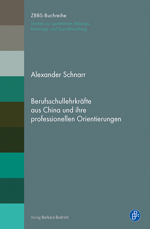 Teacher, as the executant of educational policy and teaching theory, has been studied from various perspectives. The ultimate purpose of these studies could be summarized as to promote teacher’s professionalization (German: Professionalisierung), and then to improve the teaching quality.
Teacher, as the executant of educational policy and teaching theory, has been studied from various perspectives. The ultimate purpose of these studies could be summarized as to promote teacher’s professionalization (German: Professionalisierung), and then to improve the teaching quality.
Nowadays, the significance of TVET in the society has been stressed all over the world. Without exception, TVET teacher’s professionalization has been one of the main research topics. However, professionalization, as a transforming process, should be analyzed based on the “current situation” – the professionalism (German: Professionalität) or professional action (German: professionelles Handeln) of teachers, which is the topic in this book. Additionally, Chinese TVET teachers could be seen as another key word of this study. China, as the second largest economy, has got attention of people from different backgrounds. Especially, as the nation with the largest population, Chinese vocational education is showing its attractiveness to the scholars. To study the professionalism or professional action of Chinese TVET teachers could provide scholars with more concrete information to get deeper understanding of Chinese TVET system and position it into the typology [1]. So in my view, the author has chosen the research topic wisely and this topic has research value.
In this study, three questions, put forward by the author, have been answered. The first question was regarding the antinomy of professional action in the Chinese context. The second one was to analyze the factors that have influenced the professional action from teachers’ perspective. And the third one was to see to what extend the modernization has inserted influence on teacher’s professional action.
In order to answer these questions, the study was carried out by three steps, which were data collection, data interpretation and comparison. In the process of data collection (the first step), the method – focus group – has been adopted. Nine Chinese teachers, who worked in the upper secondary vocational schools in China and continued their study in Germany when this research was conducted, have been divided into three discussion groups and asked to elaborate the problems they have met during the work and list the possible factors that have influenced the professional action. In the interpretation process (the second step), documentary method was used to analyze the collected information from the former step. Afterwards, based on the analysis result, a framework that was composed of five perspectives or orientations of the pedagogical professionalism has been devised. Ultimately, comparison (the third step) between the model devised in this study and the one put forward by Werner Helsper (1996) [2] has been made. The conclusion drawn from this step is that Helsper’s model is applicable in the Chinese context.
Following, two criterions – reliability and validity, are going to be used to evaluate this study. In the first place, the data collected from the first step is valid. The author, who is a German and cannot speak Chinese, has to organize the discussion with Chinese teachers, who cannot speak German and English fluently. Therefore, a translator has participated in this process. Afterwards the transcript should be translated into German and then the author could interpret the information based on this translated transcript. For the sake of keeping the identical understanding between the author and Chinese teachers, linguistic experts have been involved in this process. The validity has been ensured. Secondly, the reliability of this study has been guaranteed by the research design. Discussions have been conducted in three groups. The data collected from each group has been analyzed firstly and then compared between three groups, in order to get reliable result. So taking these two important aspects into consideration, I would like to say this qualitative study is of high reliability and validity.
Another highlight I would point out is the bottom-up research approach underlying this study. As an empirical study, opinions and views from teacher’s perspective have been analyzed and interpreted as the primary material. Subsequently, the result has been used to verify the applicability of the theoretical model. Nowadays, various theories in TVET sector have been put forward. However, it is unknown to us whether they are applicable in the authentic situation. So it is imperative to verify the applicability of the amount of theories. In addition, the transferability of these theories is doubtful. For example, TVET in Germany has high reputation around the world and has been seen as the model to be learned from. In this process, not only the structure of TVET system, but also the theory behind it have been studied or borrowed. Learning from this study, it is advisable and necessary to verify the transferability of these theories before they could be utilized to analyze the phenomenon in another social background. It has been proved in this study that the bottom-up research approach is one of the possible methods to verify the applicability and transferability.
All in all, in this book, with the bottom-up research approach, a valuable research topic has been discussed. It has been proved that the research result is of high reliability and validity. From my point of view, this study is of great value, not only from the practical perspective, for scholars to get insight into the Chinese TVET schools, but also from the theoretical perspective, to show the scholars the value of the bottom-up research approach.
[1] Pilz, M.: Typologies in Comparative Vocational Education: Existing Models and a New Approach. Vocations and Learning 2016, 1-20, http://doi.org/10.1007/s12186-016-9154-7
[2] Helsper, W.: Antinomien des LehrerInnenhandelns in modernisierten pädagogischen Kulturen: Paradoxe Verwendungsweisen von Autonomie und Selbstverantwortlichkeit. In: Combe, A. / Helsper, W. (Hg.): Pädagogische Professionalität: Untersuchungen zum Typus pädagogischen Handelns. Frankfurt am Main: Suhrkamp 1996, 521-569.
